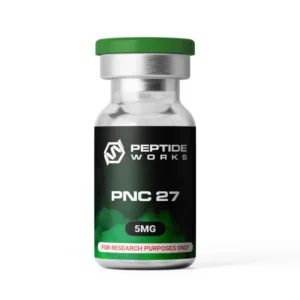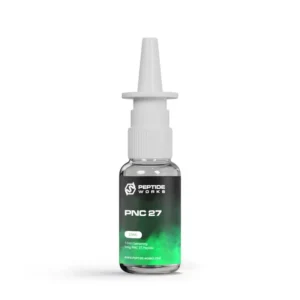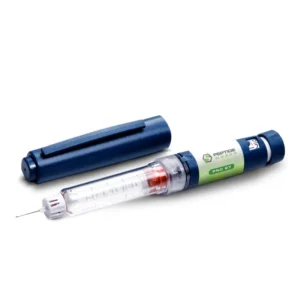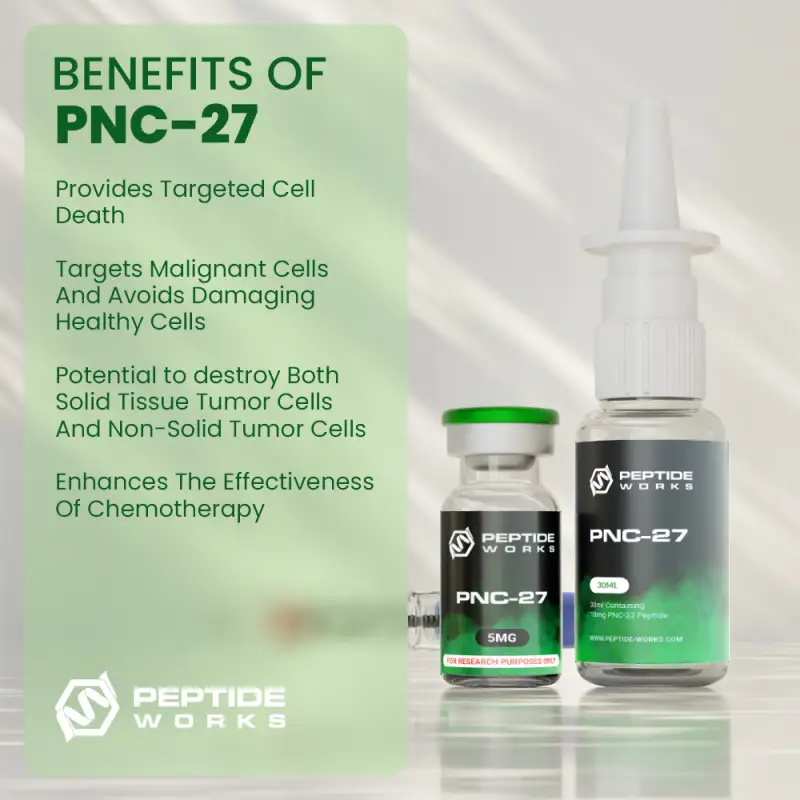PROMO!
First order? Get 10% OFF with this code: 1storder
Our Product Categories



PNC-27 is a synthetic peptide created for studies on cancer. Being an antineoplastic agent, it is intended to specifically target and cause apoptosis in cancerous cells while sparing noncancerous cells. A membrane-active undecapeptide, the peptide attaches itself to the HDM-2 protein that is expressed on the surface of particular cancer cell lines. Its potential as a targeted cancer therapy makes it relevant for oncology research.
Researching its effectiveness and mechanism presents a viable path toward creating therapies that can differentiate between cancerous and healthy tissues, possibly lowering the systemic toxicity linked to traditional chemotherapy.
Peptide Sequence (IUPAC Condensed): Pro-Pro-Leu-Ser-Gln-Glu-Thr-Phe-Ser-Asp-Leu-Trp-Lys-Leu-Leu-Lys-Lys-Trp-Lys-Met-Arg-Arg-Asn-Gln-Phe-Trp-Val-Lys-Val-Gln-Arg-Gly-OH
Molecular Formula: C188H293N53O44S
Molecular Weight: 4031.7
View the PNC-27 Certificate Of Analysis (COA)

The main mechanism of action of PNC-27 is its capacity to cause necrosis of tumor cells. The peptide specifically targets the HDM-2 protein, which is frequently overexpressed on the surface of different types of cancer cells. Transmembrane pores are created in the plasma membrane of the cancer cell by PNC-27 when it binds to the HDM-2 C-terminal domain.
Rapid cell lysis and necrotic cell death are caused by this pore formation, which compromises the integrity of the membrane. This process is not the same as the typical intracellular apoptosis pathways. Since noncancerous cells normally do not express HDM-2 on their membranes, PNC-27’s selectivity for cancer cell-surface HDM-2 enables it to spare them.
Binds membrane HDM2/MDM2 and targets tumor cells selectively:Research has shown that PNC-27 peptide selectively targets tumor cells by binding to HDM2/MDM2 proteins expressed on their membranes, a feature absent in normal cells. This peptide contains residues 12-26 of p53, which bind HDM2, and a transmembrane-penetrating domain.
Studies show PNC-27 co-localizes with membrane-bound HDM2 in cancer cells, inducing membranolysis and cell death. Normal cells lacking membrane HDM2 remain unaffected. Furthermore, introducing membrane-localized HDM2 into non-cancerous cells renders them susceptible to PNC-27, confirming its tumor-targeting mechanism. This specificity highlights PNC-27’s potential as a targeted anticancer therapy with minimal impact on healthy tissues [1].
Induces rapid membrane pore formation (tumor cell necrosis):Research shows that PNC-27 induces rapid tumor cell necrosis through a mechanism termed “poptosis,” characterized by transmembrane pore formation and intracellular content extrusion. This process is triggered by PNC-27 binding to HDM2 in cancer cell membranes, forming 1:1 complexes that dimerize to create transmembrane channels [1].
High-resolution microscopy confirms pore formation, leading to membranolysis and necrotic cell death. This effect is rapid, independent of p53 status, and specific to cancer cells, sparing normal cells with low or absent membrane-bound HDM2. PNC-27 has shown efficacy against chemotherapy-resistant cancers and metastatic tumors, highlighting its potential as a broad-spectrum anticancer therapy [2].
Selective cytotoxicity to cancer cells in vitro and in animal/ex-vivo models: PNC-27 demonstrates selective cytotoxicity against cancer cells in vitro and in animal and ex-vivo models while sparing normal cells. Studies show PNC-27 forms transmembrane pores in cancer cell membranes, inducing lysis, with no such effect on untransformed cells due to the absence of membrane-bound HDM2 [3].
In ovarian cancer models, PNC-27 effectively inhibited growth and induced cytotoxicity in both primary and chemotherapy-resistant cancer cells, while control peptides showed no effect. These findings highlight PNC-27’s potential as a targeted anticancer therapy, offering efficacy against a range of cancer types without harming normal, healthy cells [4].
Potential as a targeting ligand or delivery enhancer: PNC-27 shows potential as a targeting ligand or delivery enhancer for cancer therapies. By binding to HDM2 on tumor cells, PNC-27 improves the delivery and efficacy of therapeutic agents. For example, PNC-27-conjugated liposomes (PNC27-Doxil) significantly enhanced doxorubicin uptake and antitumor activity in HDM2-positive colon carcinoma models, without affecting biodistribution or normal cells [5].
Similarly, PNC-27-functionalized SPIONs demonstrated selective targeting and cytotoxicity in HDM2-expressing cancer cells, sparing normal cells. These findings highlight PNC-27’s promise in enhancing drug delivery and imaging precision for HDM2-positive cancers, offering a novel approach to targeted cancer treatment [6].
[1] E Sarafraz-Yazdi, W B Bowne, V Adler, et al (2010) Anticancer peptide PNC-27 adopts an HDM-2-binding conformation and kills cancer cells by binding to HDM-2 in their membranes – Proceedings of National Academy of Sciences U S A, 2010 Jan 11, Volume 107 (Issue 5), Pages 1918–1923.
[2] M R Pincus, M Silberstein, N Zohar, et al (2024) Poptosis or Peptide-Induced Transmembrane Pore Formation: A Novel Way to Kill Cancer Cells without Affecting Normal Cells † – Biomedicines, 2024 May 22, Volume 12 (Issue 6), Page 1144.
[3] K A Sookraj, W B Bowne, Victor Adler, et al (2010) The anti-cancer peptide, PNC-27, induces tumor cell lysis as the intact peptide – Cancer Chemotherapy and Pharmacology, 2010 Jul, Volume 66 (Issue 2), Pages 325-31.
[4] E Sarafraz-Yazdi, C Gorelick, A R. Wagreich, et al (2015) Ex vivo Efficacy of Anti-Cancer Drug PNC-27 in the Treatment of Patient-Derived Epithelial Ovarian Cancer – Annals of Clinical Laboratory Science, 2015 Fall, Volume 45 (Issue 6), Pages 650-8.
[5] S A Darban, A Badiee, and M R Jaafari (2017) PNC27 anticancer peptide as targeting ligand significantly improved antitumor efficacy of Doxil in HDM2-expressing cells – Nanomedicine (Lond), 2017 Jun, Volume 12 (Issue 12), Pages 1475-1490.
[6] R Rahmani, M Darroudi, M Gharanfoli, et al (2022) Conjugated PNC-27 peptide/PEI-superparamagnetic iron oxide nanoparticles (SPIONs) as a double targeting agent for early cancer diagnosis: In vitro study – Iranian Journal of Basic Medical Sciences, 2022 Oct, Volume 25 (Issue 10), Pages 1234–1242.
The answers to the most frequently asked questions about PNC-27.

PNC-27 is a synthetic peptide that binds to a protein called HDM-2 found on the surface of some cancer cells. This binding can form pores in the cell membrane, leading to the cells breaking down through a process called membranolysis. Laboratory and animal studies have observed these effects, while normal cells often remain unaffected. Research is still underway to confirm its safety and use.
Researchers found that PNC-27 primarily targets cancer cells that display the HDM-2 protein on their outer surface. When PNC-27 attaches to this protein, it can damage the cell membrane and cause the cell to die. Healthy cells usually don’t have HDM-2 on their surface, so they are less likely to be harmed. These findings come from early lab and animal studies.
PNC-27 is not approved by the U.S. Food and Drug Administration (FDA). It is sold only for laboratory and research use, not for medical or therapeutic purposes.
PNC-27 is legal to buy in the U.S. for laboratory and research purposes. It is offered by licensed research suppliers for in-vitro and preclinical studies. The peptide is not approved for human or medical use, so it must be handled according to research regulations. Researchers may purchase PNC-27 for testing, analysis, and educational studies in controlled lab settings.

This blog explores anti-cancer peptides and their unique ability to target and disrupt cancer cells. It highlights peptides such as PNC-27 and LL-37, examining their mechanisms from membrane disruption to immune modulation. These peptides show great potential to overcome drug resistance and transform cancer treatment, offering hope for more effective therapies.

The blog explores the potential of PNC-27 peptide as a groundbreaking treatment for pancreatic cancer. It explores its unique ability to selectively target cancer cells while sparing healthy tissue by binding to the HDM-2 protein. Highlighting preclinical research, the blog examines its mechanisms, challenges and future possibilities in advancing cancer treatment.

This blog delves into the complex relationship between growth hormone peptides and cancer. It explores how peptides like CJC-1295, Ipamorelin, and Sermorelin influence cellular growth, DNA repair and tumor pathways. While highlighting potential benefits like tissue repair and metabolism, it examines risks such as IGF-1 elevation, DNA damage, and cancer development through detailed research insights.
ALL CONTENT AND PRODUCT INFORMATION AVAILABLE ON THIS WEBSITE IS FOR EDUCATIONAL PURPOSES ONLY.
DISCLAIMER: These products are intended solely as a research chemical only. This classification allows for their use only for research development and laboratory studies. The information available on our Peptide Works website: https://peptide-works.com/ is provided for educational purposes only. These products are not for human or animal use or consumption in any manner. Handling of these products should be limited to suitably qualified professionals. They are not to be classified as a drug, food, cosmetic, or medicinal product and must not be mislabelled or used as such.